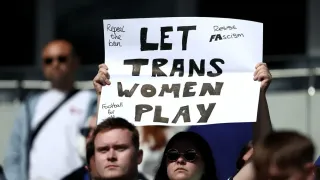
3 hours ago
Marks & Spencer Issues Apology After Customer Complains About Trans Employee’s Offer of Assistance
READ TIME: 3 MIN.
Marks & Spencer, one of the UK’s largest and most recognizable retailers, has issued an apology after receiving a complaint from a customer who objected to being offered help by a transgender employee in the lingerie section of a store. The mother reported that her 14-year-old daughter felt “distressed” when approached by the staff member, whom she referred to as a “transgender ‘woman’” and “biological male,” while they were shopping for a bra fitting. The mother described the experience as “completely inappropriate” and stated that her daughter was “visibly upset” following the interaction.
In response, Marks & Spencer contacted the customer to apologize for the distress described. The company’s statement, sent via email, said, “We deeply regret the distress your daughter felt during her visit to our store. We understand how important this milestone is for her, and we are truly sorry that it did not go as you had hoped.” The retailer further assured the mother that her concerns would be addressed and that her daughter would be assisted by a cisgender female colleague during any future visits.
The incident quickly gained traction on social media and in the national press, leading to polarized responses. Notably, JK Rowling, author and high-profile commentator on gender issues, called for a boycott of Marks & Spencer, stating on X (formerly Twitter) that it was “wrong that the store had ‘prioritised the wishes of men’ by allowing the staff member to approach the girl.” Rowling further urged, “It’s time for women to vote with their wallets,” referencing her stance that women’s spaces should be restricted to cisgender women.
The apology issued by Marks & Spencer has drawn criticism from both sides of the debate. Some have argued that the company should not apologize for employing transgender staff, while others insist that women and girls should have the right to request assistance from cisgender female employees in intimate settings.
There is no indication from available reports that the transgender employee acted improperly or violated store policy during the interaction. LGBTQ+ advocates have expressed concern that the apology may stigmatize transgender employees and set a worrying precedent for workplace inclusion. Commentators such as Carrie Marshall have noted that the heart of the complaint was not about any misconduct, but rather about the employee’s identity, stating, “There is no suggestion that the employee said or did anything wrong. The complaint is simply that a trans person has a job”.
The case has reignited public discussion about the rights of transgender people in the workplace and access to gender-affirming employment opportunities. Advocates emphasize that policies of inclusion are essential to ensure the safety and dignity of transgender staff and customers alike. Many large UK retailers, including Marks & Spencer, have previously committed to supporting LGBTQ+ employees and have participated in Pride initiatives promoting workplace equality.
Industry groups and LGBTQ+ organizations have responded by reiterating the importance of non-discrimination in the workplace. Representatives from leading equality charities argue that retail environments must strike a balance between respecting customers’ privacy and upholding principles of equality and diversity. They warn that caving to demands for exclusion based on gender identity could have far-reaching negative effects for LGBTQ+ inclusion in the retail sector.
Marks & Spencer has not indicated any change to its employment or inclusion policies in response to this incident. The company’s spokesperson reaffirmed its commitment to “inclusion and respect for all staff and customers,” and stated that all employees are expected to adhere to company policies and treat customers with professionalism and courtesy.
The incident has sparked ongoing debate in the UK about the rights of transgender people in public-facing roles and the responsibilities of employers to balance inclusion with customer service concerns. As the conversation continues, LGBTQ+ advocates are calling for clearer guidance and stronger protections to ensure that transgender employees are not singled out or discriminated against for performing their jobs professionally.
For now, Marks & Spencer’s response—and the public reaction to it—highlights the complexities that major retailers face as they navigate evolving expectations around inclusion, privacy, and respect for diverse identities in the workplace.






